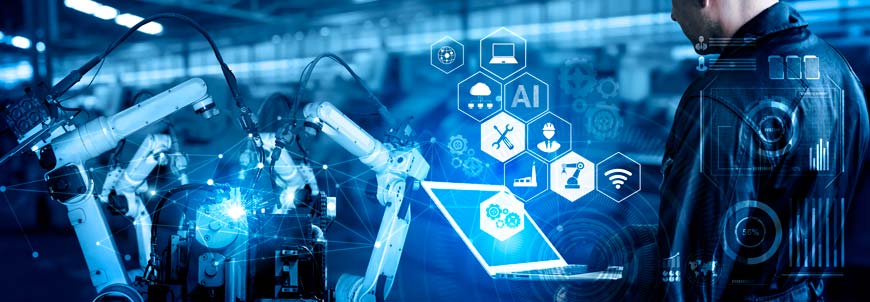The Impact of AI on Manufacturing Processes
Artificial Intelligence (AI) is revolutionizing the manufacturing industry, bringing unprecedented levels of efficiency, precision, and innovation to production processes. From predictive maintenance to quality control, AI is reshaping how we create and produce goods.

Key Areas of AI Impact in Manufacturing
- Predictive Maintenance: AI algorithms forecasting equipment failures before they occur
- Quality Control: Machine vision systems detecting defects with superhuman accuracy
- Supply Chain Optimization: AI-driven systems managing inventory and logistics
- Generative Design: AI creating optimized product designs
- Robotics and Automation: Advanced AI powering more flexible and adaptive robots
Challenges and Opportunities
While AI offers immense potential, its implementation comes with challenges:
- High initial investment costs
- Need for specialized skills and training
- Data security and privacy concerns
However, the long-term benefits in terms of efficiency, quality, and cost savings make AI adoption a compelling proposition for manufacturers.
The Future of AI in Manufacturing
As AI technology continues to evolve, we can expect to see:
- Fully autonomous factories
- AI-driven product customization at scale
- Enhanced worker safety through AI-powered monitoring systems
The integration of AI in manufacturing goes beyond just automation. Here's a deeper look at some emerging trends:
- Digital Twins: AI is powering the creation of digital replicas of physical manufacturing processes. These digital twins allow for real-time monitoring, simulation, and optimization of production lines.
- Edge AI: By processing data closer to its source, edge AI is enabling faster decision-making and reducing latency in manufacturing operations, crucial for time-sensitive processes.
- AI in Additive Manufacturing: In 3D printing, AI is being used to optimize print parameters, predict and correct errors, and even generate entirely new designs that were previously impossible.
- Natural Language Processing in Manufacturing: NLP is being used to convert manuals and documentation into interactive, voice-controlled assistants, making information more accessible on the factory floor.
- AI-Powered Energy Management: Artificial Intelligence is optimizing energy consumption in factories, contributing to both cost savings and sustainability goals.
- Collaborative AI: Advanced AI systems are working alongside human workers, augmenting their capabilities and improving overall productivity.
- AI in Quality Assurance: Beyond visual inspection, AI is being used to analyse sound, vibration, and other sensory data to detect defects and anomalies in products and processes.
As these AI technologies mature, the need for comprehensive, adaptable training solutions becomes even more critical. OpenManufacturing.ai incorporates AI-focused modules, ensuring that workers can effectively leverage these new technologies while maintaining safety standards.
The future of manufacturing is intelligent, efficient, and increasingly flexible. As AI continues to evolve, it will play an even more significant role in shaping the industry, driving innovation, and addressing longstanding challenges in production and quality control.